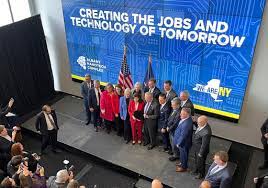Governor Kathy Hochul said on Monday that New York State will invest $1 billion to increase chip research in Albany, the state capital, to make the area a worldwide hub for semiconductor research and manufacturing.
According to her, the investment will strengthen New York’s application for federal grants under the CHIPS and Science Act, which will allocate over $52 billion for semiconductor manufacturing and research. It is a component of a long-term strategy to deprive rivals, especially China, of dominance in the sector.
“There’s a competition to dominate the world. That’s why we’re here.” A Democratic Senator from New York, Sen. Chuck Schumer, and representatives of the semiconductor industry joined Hochul at a press conference. And I’m here to declare that the state of New York will prevail in that contest.
According to a statement from the government, the proposal includes the purchase of a next-generation lithography machine for the production of computer chips and will eventually create 700 new jobs.
Companies, including semiconductor manufacturer Micron and designer IBM, will contribute an additional $9 billion to match the state’s $1 billion commitment. A portion of the funds will be used to build the University of Albany’s chip research lab.
According to Sen. Charles Schumer, the public-private cooperation will contribute to “making discoveries that engineers today can barely imagine and ensuring that the semiconductor industry’s future—both in terms of manufacturing and research—is developed right here in upstate New York.”
No hiring or industry investment timeframe was provided by New York officials.
The statement coincided with the Biden administration’s declaration that it would give BAE Systems $35 million in CHIPS Act cash to boost output at a New Hampshire facility that produces chips for military aircraft.
Over the past few years, New York has relied on incentives to support its semiconductor industry. One such package, worth $1.4 billion, was used to land a chip facility near Saratoga Springs, where construction started in 2009. In an attempt to entice Micron to Syracuse, the state reportedly promised $5.5 billion in tax benefits.

















